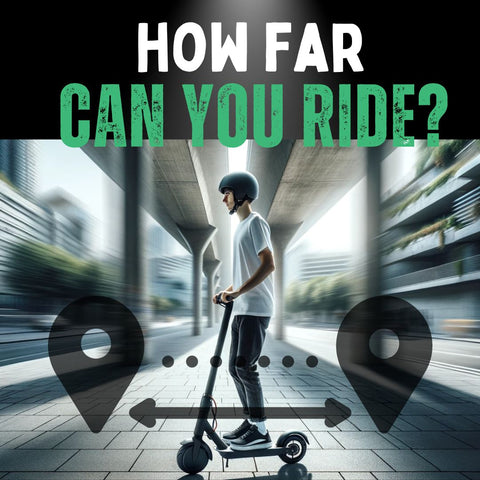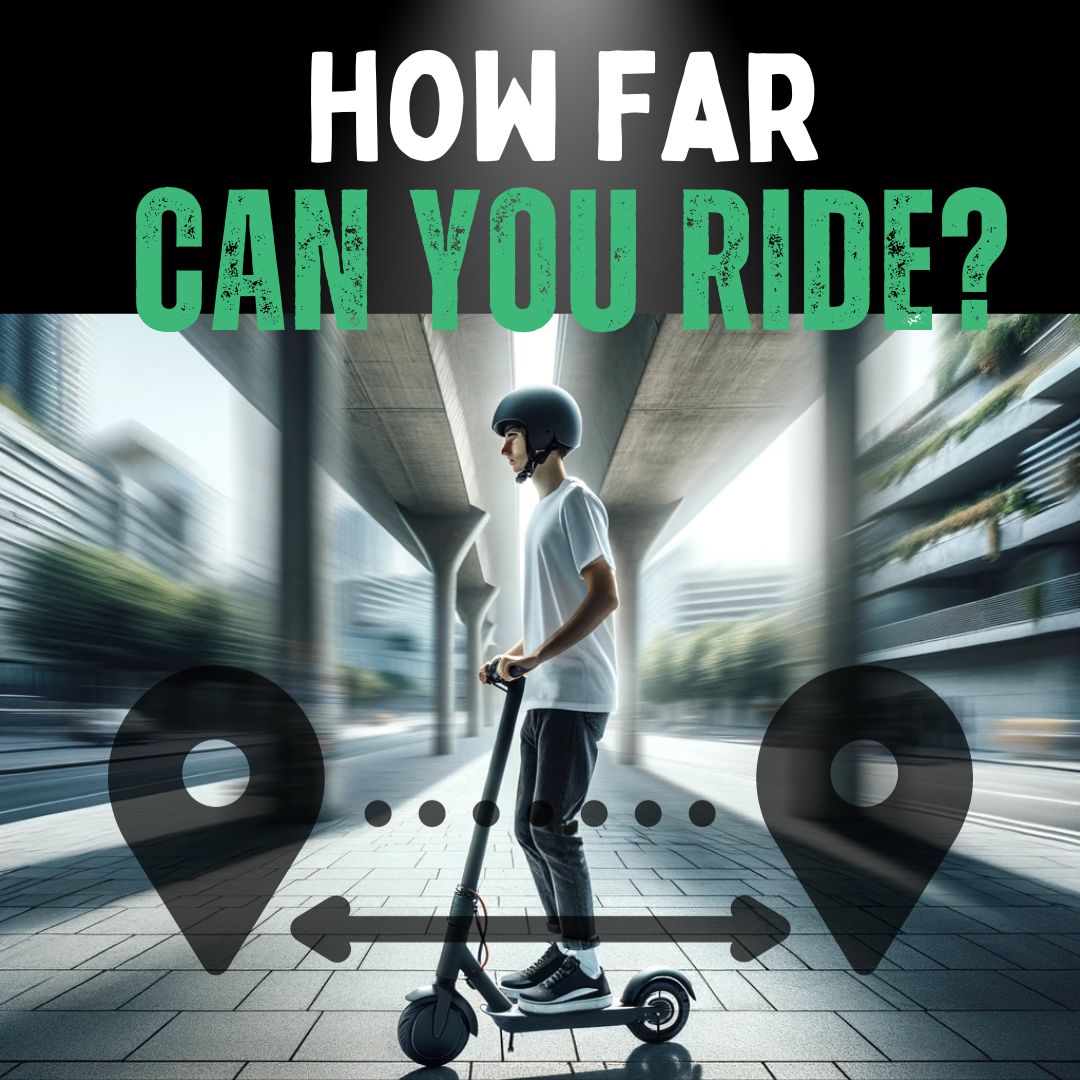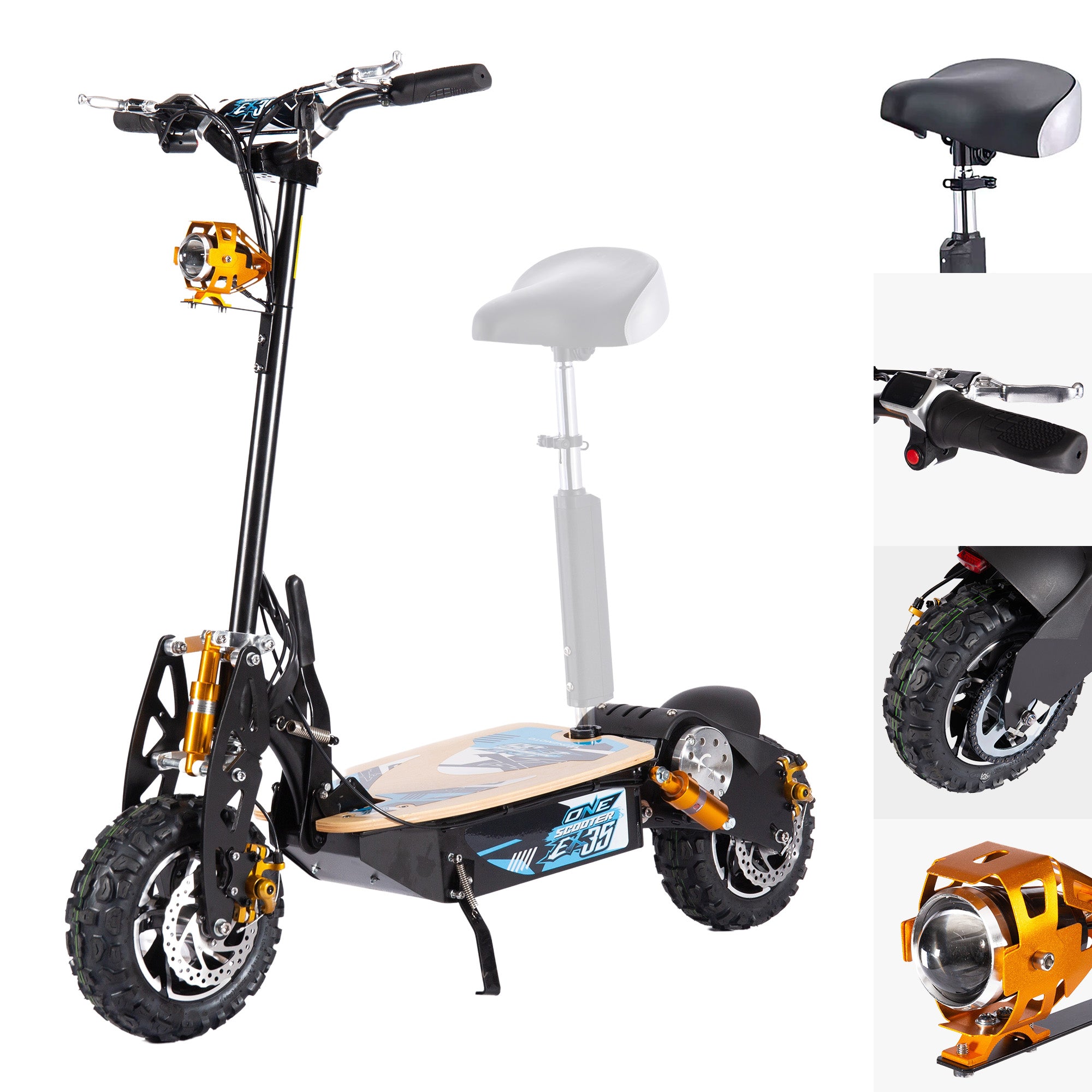
Updated: 16.05.25
Electric scooters have become a stylish solution for navigating busy city streets while reducing your carbon footprint. Perfect for quick commutes or leisurely rides, their popularity continues to soar. But how far can you travel on a single charge? Let’s explore the factors that determine your electric scooter’s range and how to maximise it.
1. Factors Affecting Your Electric Scooter’s Range
Several variables influence how far your e-scooter can go:
- Make and Model: High-end models can reach up to 97 km (60 miles), while budget options may cover only 8 km (5 miles).
- Rider Weight: Heavier riders reduce range as the motor works harder.
- Speed Mode: Slower speeds conserve battery, extending range.
- Terrain: Flat surfaces are ideal; hills drain the battery faster.
- Battery Age and Type: Older batteries or lead-acid types offer less range than modern lithium-ion batteries.
Related: Can E-Scooters Be Used on Pavements?
2. Best Practices for Battery Longevity
Proper charging habits extend your e-scooter’s battery life and range:
- Charge Routinely: Keep the battery between 20% and 80% to avoid stress from full charges or discharges.
- Optimal Environment: Charge in a cool, dry place to prevent overheating or moisture damage.
- Use Quality Chargers: Stick to the manufacturer’s charger to match voltage and current requirements.
Related: Tips for Maximising Electric Scooter Battery Life
Related: What Are the Rules for Electric Scooters in London?
3. Average E-Scooter Range
Ranges vary by model:
- Entry-Level: ~8 km (5 miles), ideal for short trips.
- Mid-Range: 11–24 km (7–15 miles), suitable for daily commutes.
- Premium Models: Up to 97 km (60 miles), perfect for long rides.
Related: Are Electric Scooters Legal on UK Roads?
4. Tips to Maximise Your E-Scooter Range
Stretch your ride with these strategies:
- Maintain Tyre Pressure: Proper inflation reduces resistance, saving battery.
- Avoid Overloading: Stick to weight limits to preserve energy.
- Choose Flat Routes: Minimise hills to conserve power.
- Ride Smoothly: Gentle acceleration and braking extend range.
- Use Regenerative Braking: Gradually brake, especially downhill, to recover energy.
Watch this video for more tips:
Related: The Best Electric Scooter Brake Guide
5. Advances in Battery Technology
New battery technologies are boosting e-scooter ranges:
- Lithium-Sulfur Batteries: Higher energy density for longer rides.
- Solid-State Batteries: Safer and more efficient, promising extended range.
Related: How Long Do Lithium-Ion Batteries Last?
6. Safety Tips for E-Scooter Riders
Stay safe with these tips:
- Wear Safety Gear: Always use a helmet, knee pads, elbow pads, and reflective clothing.
- Control Speed: Start slow and avoid sudden movements.
- Lean into Turns: Smooth turns enhance stability.
- Shop for Accessories: Explore e-scooter accessories for enhanced safety.
| Gear Type | Features | Price Range |
|---|---|---|
| Helmet | Impact-resistant, ventilated | £40–£120 |
| Knee Pads | Cushioned, adjustable straps | £20–£70 |
| Elbow Pads | Hard shell, foam padding | £15–£60 |
| Reflective Clothing | High visibility, weatherproof | £30–£100 |
7. Understanding E-Scooter Specifications
When choosing an e-scooter, consider:
- Battery Capacity: Higher mAh ratings mean longer range.
- Motor Efficiency: More efficient motors conserve energy.
- Rider Weight: Heavier riders need more powerful models.
- Terrain: Hilly areas require robust batteries.
Manufacturers list maximum ranges under ideal conditions (e.g., 75 kg rider, flat terrain, moderate speed). Adjust expectations for real-world factors like hills or heavier weight.
8. Performance in Different Conditions
| Condition | Performance Factor | Advice |
|---|---|---|
| Light Rain | Moderate impact on traction | Use waterproof gear, ride slowly |
| Heavy Rain | High impact on traction and visibility | Avoid riding, use alternative transport |
| Hilly Terrain | Increased battery consumption | Ensure full charge before riding |
| High Temperatures | Possible overheating of components | Limit use during peak heat, store in cool place |
| Cold Weather | Reduced battery performance | Keep battery insulated, carry a spare if needed |
Summary
Your e-scooter’s range depends on its model, rider weight, speed, terrain, and battery condition. By maintaining proper tyre pressure, using regenerative braking, and adopting smart charging habits, you can maximise your ride. Stay safe with proper gear and explore RiiRoo’s electric scooters for your next adventure!
Get in Touch 🚀
Loved our guide on e-scooter range? Discover more tips at RiiRoo.com.
Have questions about electric scooters? Try our Live Chat or browse our scooter collection!
Frequently Asked Questions
How far can an electric scooter travel on a single charge?
Ranges vary: entry-level scooters cover ~8 km (5 miles), mid-range models reach 11–24 km (7–15 miles), and premium scooters can go up to 97 km (60 miles), depending on weight, terrain, and speed.
How can I maximise my e-scooter’s battery life?
Keep the battery between 20% and 80%, charge in a cool, dry place, use the manufacturer’s charger, and maintain proper tyre pressure to reduce energy loss.
Is it safe to ride an e-scooter in the rain?
Light rain is manageable with waterproof gear and slow speeds, but avoid heavy rain to prevent damage to electrical components. Check your scooter’s IP rating for water resistance.
What safety gear should I wear when riding an e-scooter?
Wear a helmet, knee and elbow pads, and reflective clothing. Explore e-scooter accessories for high-quality gear.
How long does an e-scooter battery last?
Lithium-ion batteries last 300–500 charge cycles (2–5 years) with proper care, such as avoiding extreme temperatures and full discharges.








Share:
Is It Worth Buying An Electric Scooter in 2025?
Kids Ride on Toy Buyers Guide For 2025